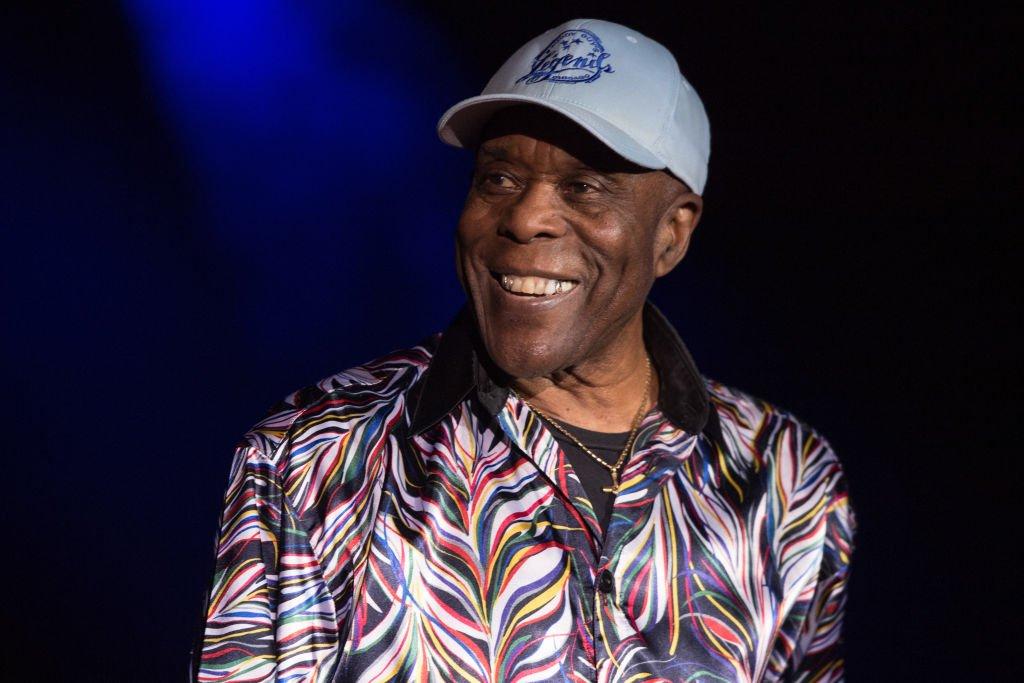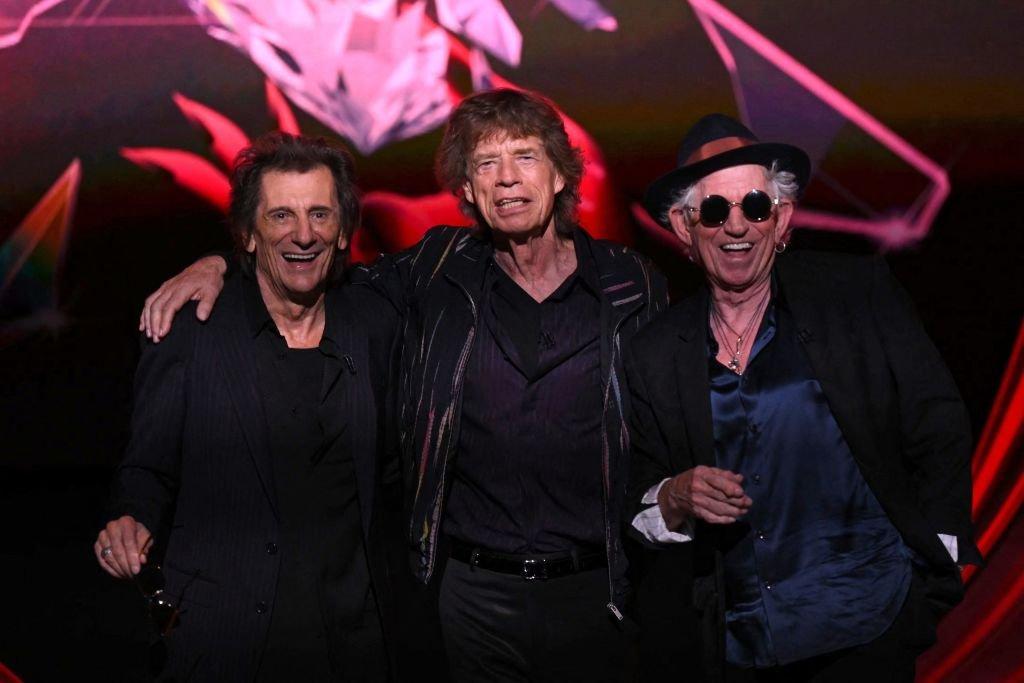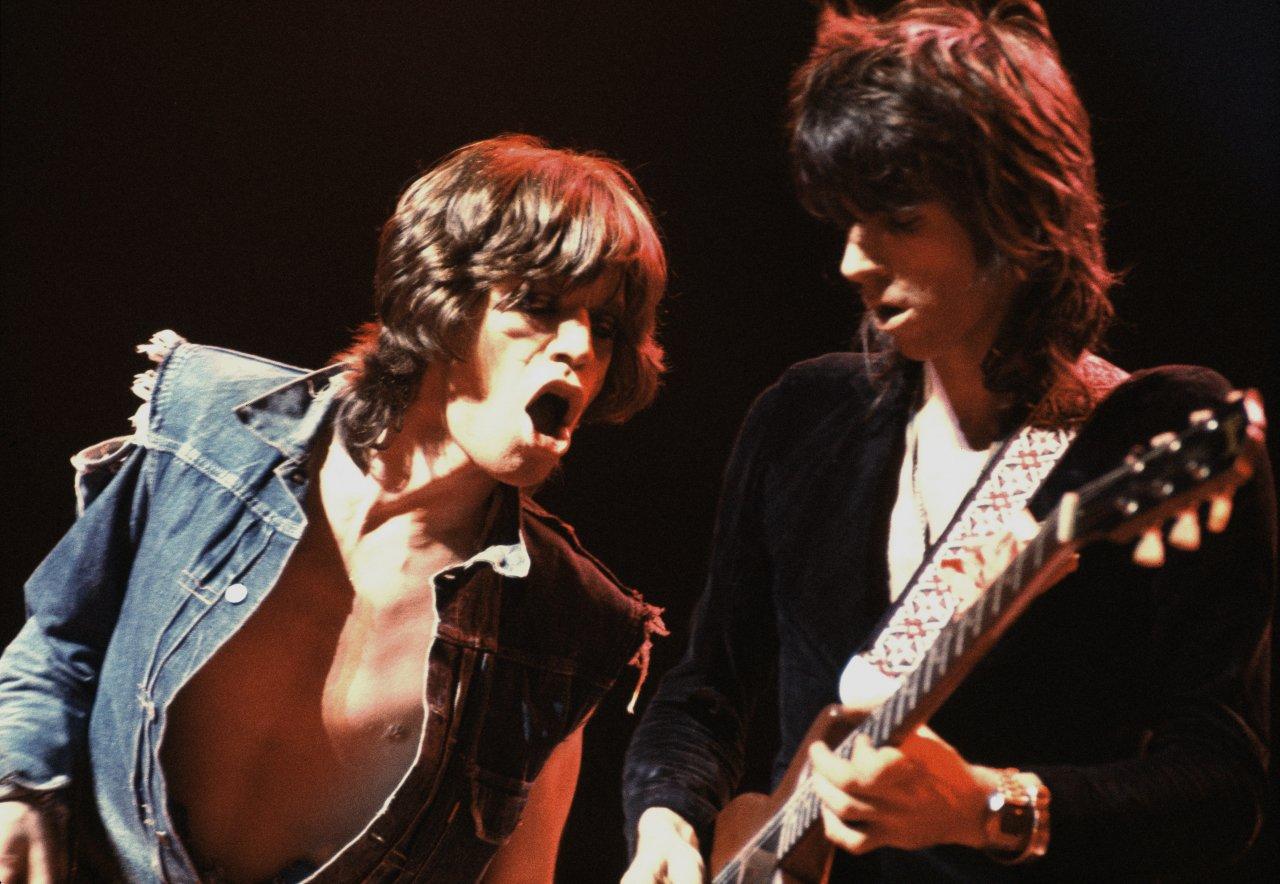Photo: Marcus Ingram/Getty Images

Buddy Guy
news
Buddy Guy's "Cognac": Trading Solos With Jeff Beck, Keith Richards
Take a listen as three masters trade blues solos and give a shout-out to Muddy Waters
On June 6 blues master guitarist Buddy Guy released the third sip from his upcoming album, The Blues Is Alive And Well, which is expected on June 15. He joined his expressive gifts with colleagues Jeff Beck and Keith Richards for a spell-binding dip into the blues.
<iframe width="620" height="349" src="https://www.youtube.com/embed/nzztqp6rE3I" frameborder="0" allow="autoplay; encrypted-media" allowfullscreen></iframe>
"Let's play some blues while we all take a little nip," is Guy's recommendation on the five-minute-plus track "Cognac," which adds a call out to Muddy Waters to join in from guitar heaven. "I'm only playing what I know," says Guy as he calls Richards and Beck in and out, with their distinctive styles and sounds. It all equals a feast for the guitar-listening senses.
The tracklist for Guy's forthcoming LP was revealed last month and also features a collaboration with Richards' bandmate Mick Jagger as well as recent Best New Artist GRAMMY nominee James Bay. Bay's second album, Electric Light, was released in May, and his "Blue No More" collaboration with Guy was released on May 30, with the newcomer more than holding his own.
<iframe allow="autoplay *; encrypted-media *;" frameborder="0" height="450" sandbox="allow-forms allow-popups allow-same-origin allow-scripts allow-top-navigation-by-user-activation" src="https://embed.music.apple.com/us/album/the-blues-is-alive-and-well/1385292932?app=music" width="660"></iframe>
If "Cognac" and "Blue No More" are any indication, fans are in for a treat with Guy's upcoming album. Indeed, it would seem The Blues Is Alive And Well.

Photo: DANIEL LEAL/AFP via Getty Images
news
5 Takeaways From The Rolling Stones' 'Hackney Diamonds'
On their first album in 18 years, the Rolling Stones prove that age ain’t nothing but a number. 'Hackney Diamonds' is a vital-sounding return-to-form which channels the anger, lust, and vigor of their rock 'n' roll heyday.
"Is my future all in the past?" laments Keith Richards on "Tell Me Straight," the grungiest number from the Rolling Stones' 26th studio effort (or their 24th if you're from the UK), Hackney Diamonds. Despite approaching the age of 80, a milestone Mick Jagger passed this summer, the answer isn't the obvious one.
Indeed, while most of their peers have long since settled into retirement, rock 'n' roll's most enduring partnership is still attempting to extend their legacy. And for the first time since 2005's A Bigger Bang, with an album of largely original material, too. It's an approach which appears to have re-energized the Stones so strongly they now sound, musically anyway, like a band bursting out of the blocks rather than one nearing the finish line.
In fact, the group were so productive during their recording sessions that they already have a follow-up 75 percent completed. If it's even half as vibrant as its predecessor, then fans are in for another down and dirty treat.
Of course, Hackney Diamonds is inevitably tinged with sadness, too, being their first LP since the death of Charlie Watts in 2021. However, with recording sessions beginning the year previously — the pandemic, Richards' arthritis struggles, and apparently Jagger's general lack of enthusiasm causing the lengthy delay — the legendary drummer still makes a couple of posthumous contributions.
But as implied by its title, a London slang term for the remains of a window smashed by thieves, the record's overall tone is loud, punchy, and purposeful. Here are five takeaways from the band's latest triumph.
The Band Get By With A Little Help From Their Friends
Boasting appearances from no fewer than four genuine musical icons, including two with knighthoods to their name, Hackney Diamonds is by far the most star-studded album in the Stones' 61-year career.
That's Elton John tinkling the ivories on the funky "Get Close" and barroom stomper "Live By the Sword," while Paul McCartney appears to have been forgiven for last year's spot of shade-throwing ("I'm not sure I should say it, but they're a blues cover band, that's sort of what the Stones are"): he provides the fuzzed-up basslines on the expletive-filled punk of "Bite My Head Off."
Yet it’s the double whammy of Lady Gaga and Stevie Wonder on the slow-burning "Sweet Sounds of Heaven" who make the biggest impression. The former delivers the strongest powerhouse vocals of her career during a call-and-response which echoes the Merry Clayton-assisted classic "Gimme Shelter." Wonder, who toured with the Stones back in the '70s, meanwhile, works his usual magic on the keys to imbue the seven-minute epic — possibly the finest track the Stones have recorded this century — with an authentic gospel edge.
The Stones Aren't Afraid To Get Nostalgic
While Hackney Diamonds largely avoids talk of mortality, loss or other somber themes you may expect from a band whose youngest permanent member, Ronnie Wood, is 76, it's not afraid to get a little nostalgic.
The blistering "Whole Wide World" essentially plays out like a beginner's guide to the Stones' '60s years, whether it's reminiscing about their pre-fame stint in a "filthy flat in Fulham" or bemoaning the era when both the tabloids and the cops watched their every move. And amid the bluesy harmonica and slide guitars on "Dreamy Skies," Jagger pines for a getaway with nothing but an AM radio playing country crooner Hank Williams for company.
The trip down memory lane most longtime fans will be interested in, however, is "Live by the Sword." Thanks to appearances from Watts and former bassist Bill Wyman, it's the closest the Stones have got to their imperial phase line-up since 1989's Steel Wheels.
Mick Jagger Is Still A Horndog
He might now be an octogenarian, yet judging by the amount of relationship talk on Hackney Diamonds, Jagger still has the libido of a rocker half his age.
"Driving Me Too Hard" and "Bite My Head Off" both add to the Stones' arsenal of woman trouble anthems, while on "Get Close," Jagger roams around the streets at midnight to make a potentially lascivious pact ("I bargained with the devil, I need heaven for one night").
Further evidence the singer still isn't ready for the pipe and slippers lifestyle yet comes with "Mess It Up," a disco-infused tale of a vengeful ex who's stolen his mobile phone, unlocked his passwords, and shared a particular photo among all her friends. We're left to guess how incriminating said image is.
It Brings Things Full Circle
Hackney Diamonds doesn't entirely abandon the covers approach that defined 2016's Blues and Lonesome. Following ten original compositions, it wraps things up with a stripped-back rendition of "Rolling Stone Blues," the Muddy Waters classic which played a significant part in Jagger and Richards' story.
Not only did the 1950 number — a loose interpretation of Delta blues standard "Catfish Blues" — inspire the band’s name, it was also one of several records a teenage Richards was carrying under his arm during that pivotal train station reunion with his childhood friend. Recognizing they both shared similar musical tastes, the pair began hanging out again and the rest is rock and roll history.
This is the first time the Stones have celebrated such a sliding doors moment on record and should the proposed 25th album fail to materialize, a hugely touching way to bring things full circle.
It's Their Best Album In More Than 40 Years
The Stones have occasionally captured the brilliance of their chart-topping days over the past 40 years, with the mammoth world tour-launching Steel Wheels, outtakes collection Tattoo You, and their last MTV hurrah Voodoo Lounge all containing best of-worthy material. But Hackney Diamonds is their first LP that can be considered as truly essential since 1978 return-to-form Some Girls.
While the majority of latter-day Stones efforts have come across as merely promotional tools for their latest stadium trek, their latest stands on its own two feet. In fact, there isn't a dud among its 11 tracks, with everyone from co-producer Don Was to regular live musicians Matt Clifford, Darryl Jones, and Steve Jordan at the top of their game.
"I don't want to be big headed," Jagger told Jimmy Fallon at the album's East London launch last month. "But we wouldn't have put this record out if we hadn't really liked it." The rock god needn't have worried about sounding immodest. In fact, he could have got away with shouting about it from the rooftops.
7 Reasons Why The Rolling Stones' 'Goats Head Soup' Is Worth Savoring

Photo: Jeff Kravitz/FilmMagic
video
GRAMMY Rewind: Kendrick Lamar Honors Hip-Hop's Greats While Accepting Best Rap Album GRAMMY For 'To Pimp a Butterfly' In 2016
Upon winning the GRAMMY for Best Rap Album for 'To Pimp a Butterfly,' Kendrick Lamar thanked those that helped him get to the stage, and the artists that blazed the trail for him.
Updated Friday Oct. 13, 2023 to include info about Kendrick Lamar's most recent GRAMMY wins, as of the 2023 GRAMMYs.
A GRAMMY veteran these days, Kendrick Lamar has won 17 GRAMMYs and has received 47 GRAMMY nominations overall. A sizable chunk of his trophies came from the 58th annual GRAMMY Awards in 2016, when he walked away with five — including his first-ever win in the Best Rap Album category.
This installment of GRAMMY Rewind turns back the clock to 2016, revisiting Lamar's acceptance speech upon winning Best Rap Album for To Pimp A Butterfly. Though Lamar was alone on stage, he made it clear that he wouldn't be at the top of his game without the help of a broad support system.
"First off, all glory to God, that's for sure," he said, kicking off a speech that went on to thank his parents, who he described as his "those who gave me the responsibility of knowing, of accepting the good with the bad."
Looking for more GRAMMYs news? The 2024 GRAMMY nominations are here!
He also extended his love and gratitude to his fiancée, Whitney Alford, and shouted out his Top Dawg Entertainment labelmates. Lamar specifically praised Top Dawg's CEO, Anthony Tiffith, for finding and developing raw talent that might not otherwise get the chance to pursue their musical dreams.
"We'd never forget that: Taking these kids out of the projects, out of Compton, and putting them right here on this stage, to be the best that they can be," Lamar — a Compton native himself — continued, leading into an impassioned conclusion spotlighting some of the cornerstone rap albums that came before To Pimp a Butterfly.
"Hip-hop. Ice Cube. This is for hip-hop," he said. "This is for Snoop Dogg, Doggystyle. This is for Illmatic, this is for Nas. We will live forever. Believe that."
To Pimp a Butterfly singles "Alright" and "These Walls" earned Lamar three more GRAMMYs that night, the former winning Best Rap Performance and Best Rap Song and the latter taking Best Rap/Sung Collaboration (the song features Bilal, Anna Wise and Thundercat). He also won Best Music Video for the remix of Taylor Swift's "Bad Blood."
Lamar has since won Best Rap Album two more times, taking home the golden gramophone in 2018 for his blockbuster LP DAMN., and in 2023 for his bold fifth album, Mr. Morale & the Big Steppers.
Watch Lamar's full acceptance speech above, and check back at GRAMMY.com every Friday for more GRAMMY Rewind episodes.
10 Essential Facts To Know About GRAMMY-Winning Rapper J. Cole

Photo: Michael Putland/Getty Images
list
7 Reasons Why The Rolling Stones' 'Goats Head Soup' Is Worth Savoring
Some critics consider 'Goats Head Soup' to mark the beginning of the Stones' decline. But exhaustion turned out to be one of the Stones' most satisfying moods.
Energetically speaking, the Rolling Stones' 1970s run is something of a reverse parabola — it goes up, and then down.
After 1968's acoustic-focused Beggars Banquet — basically their Led Zeppelin III — and 1969's blues-drenched Let it Bleed, the Stones really started to burn rubber. 1971's gloriously decadent Sticky Fingers was the final ramp-up to their arguable masterpiece: the following year's Exile on Main St.
Across four greasy sides, the Stones went from riotous, disheveled fun to Sunday morning-style ache and longing: it seemingly contains the totality of the Glimmer Twins' art in microcosm.
As Exile on Main St. was such a skyscraping achievement, it's natural to wonder if what followed was a downturn. Enter Goats Head Soup, its 1973 follow-up, which turns 50 today.
Lumpy and undulating, Goats Head Soup is mostly known as the album that gave us their No. 1 ballad "Angie"; "Doo Doo Doo Doo Doo (Heartbreaker)" also broke the Top 20 on the Hot 100. On the main, it's an elliptical, hazy listen — like the strewn detritus from the Exile on Main St. sessions coagulated into a hobbling automaton.
There is no "Street Fighting Man" or "Gimme Shelter" or "Brown Sugar." Instead, we get the crawling "Dancing With Mr. D," the dog-tired "Coming Down Again," and the shaking-apart "Star Star." More than almost any other Stones album, Goats Head Soup is its own universe.
For better or worse, Goats Head Soup is stuck in first gear. But for Stones fans wired a certain way, that's a feature, not a bug.
When the Stones sound exhausted, that's a Stones worth savoring. And despite any number of middling contemporaneous reviews, Goats Head Soup is where this beautiful comedown began. Here are 10 reasons why you should give this sui generis Stones platter a shot.
"Dancing With Mr. D" Is Something Else
From Keith Richards’ deliciously ominous opening riff forward, "Dancing With Mr. D" proves itself to have almost no analog in the Stones’ catalog.
"Yeah, down in the graveyard where we have our tryst/ The air smells sweet, the air smells sick/ He never smiles, his mouth merely twists," Mick Jagger sputters. "The breath in my lungs feels clinging and thick/ The palms of my hands is clammy and wet."
Does Mr. D’s initial stand for death? For devil? Whatever the case, Jagger’s indulging in some macabre fun.
"Coming Down Again" Is A Buzzkill For The Ages
There’s a certain, unforgettable weariness to Keith Richards’ Stones songs, and "Coming Down Again" is something of a downcast masterpiece.
Before you ask, yes, it’s about drugs — these are the Stones in the ‘70s, after all. But take junkie mythology out of the equation, and it’s simply a thing of windswept, head-hung-low beauty.
Dig Billy Preston With The Stones!
In the years following the events of the Beatles’ Get Back documentary, keyboardist Billy Preston was in demand as a session cat: he appeared on solo albums by three of four Beatles, as well as those by Sly and the Family Stone, Joe Cocker, and — yes — the Stones.
Preston had previously appeared on Sticky Fingers and Exile on Main St.; on "100 Years Ago," he plays inspired clavinet, and on "Doo Doo Doo Doo Doo (Heartbreaker)," he doubles the clavinet with piano. Speaking of…
Minor Hit "Doo Doo Doo Doo Doo (Heartbreaker)" Remains Satisfying
Despite its kicked-up tempo, "Doo Doo Doo Doo Doo (Heartbreaker)" doesn’t exactly rock; it simmers and hovers.
Lyrically, it presents mirror examples of urban tragedy: a young man shot by police in a case of mistaken identity, and a 10-year girl who ODs in an alley. But a ripped-from-the-headlines "Hurricane"-style story song it isn’t.
Decades later, Jagger denied any specific, real-world inspiration, chalking it up to "New York as a violent place. America as a heavy-handed police state.
"We can go back 100 years and it's probably even heavier," Jagger continued. "Obviously, all that time ago it was heavy in a lot of places, heavy now and heavy before."
"Angie" Is Immortal For Very Good Reasons
Who is Angie? Is it Angela Bowie? Marianne Faithfull?
This talk can safely be consigned to the rock lore archives, as it’s beside the point: "Angie" is simply a gorgeous song. (Although your mileage may vary with Jagger’s whispering.)
For an expert appraisal of what makes this majestic — and wildly popular — single tick, check out Rick Beato’s analytical YouTube video, for his What Makes This Song Great? series.
Much Of The Bluster Had Worn Off
Yes, we come to the Stones for cocksurity and bravado, but it’s arguably even more interesting when those qualities lose their luster.
Take two of the most horny cuts: "Silver Train" is about a prostitute; "Star Star" is about a groupie. But rather than sound hyped-up, they sound fragile, like machismo is an old costume that didn’t fit them at that moment.
Giles Martin Has Freshened Up Goats Head Soup
As a Beatles remixer, Giles Martin didn’t fall far from the tree; his father, of course, was iconic Fabs producer George Martin.
After making his mark with Sgt. Pepper’s, Abbey Road and the like, Martin has begun working with other camps — the Stones included.
His 2020 remix of Goats Head Soup wipes away the grime and reveals its vulnerable, autumnal heart. Truly, despite its mixed-bag reputation, this stew has never been so savory.

Photo: Venla Shalin/Redferns
news
Remembering Jeff Beck: 5 Essential Tracks From The Guitar Wizard And Influential Innovator
Jeff Beck passed away on Jan. 11 at age 78. The virtuoso guitarist's soul, tone and techniques influenced generations of guitarists. His six-decade career netted eight GRAMMY Awards and many memorable songs.
Only 11 days into the new year and yet another rock elder has gone off to that great gig in the sky. The latest news came late Wednesday afternoon: Jeff Beck, 78, died peacefully after suddenly contracting bacterial meningitis.
Social media was immediately flooded with tributes from fellow guitar greats such as David Gilmour and Tony Iommi. In a tweet, Jimmy Page called Beck a "six stringed warrior" who "could channel music from the ethereal." In a short farewell posted via her Substack newsletter, Patti Smith described Beck as "quiet as moccasined feet, yet mercurial, innovative, impossible to categorize," and "a guitarist in the highest sense."
Beck remained an active musician until his passing. In 2022, he released 18 with actor Johnny Depp. He is featured on Ozzy Osbourne’s "Patient No. 9," which is nominated for Best Rock Song and Best Rock Performance at the 2023 GRAMMY Awards.
The British guitar slinger’s unique stylings and mastery of his instrument influenced generations of players. In 1965, on the advice of Page, Beck replaced Eric Clapton in the Yardbirds. Two years later, he left the electric blues band to form the Jeff Beck Group with Rod Stewart and a then unknown Ron Wood on bass. Their 1968 debut, Truth, showcased how Beck’s various influences — sprinklings of jazz and funk, mixed with rock and blues — could create a new sound that resembles what, today, we call hard rock or heavy metal. Back then, it was just known as the Jeff Beck sound.
Beck built his first guitar when he was still a teenager, and constantly found new tones and broke new ground on his beloved instrument. Through experimentation and constant exploration of what his instrument could do, the guitarist is credited with advancing feedback techniques, and incorporating distortion and bends into his playing. Blow by Blow, his second solo record, reached No. 4 on the Billboard charts and was his most commercially successful — selling more than one million copies.
Beck won eight GRAMMY Awards over the course of his nearly six-decade career and was twice inducted into the Rock and Roll Hall of Fame. Even as he approached his 80th year, Beck continued to quietly innovate. Here are five Essential Jeff Beck songs to honor this guitar great gone too soon.
"Scatterbrain" (1975)
The George Martin-produced "Scatterbrain" from his commercial breakthrough Blow by Blow, t is a co-write with keyboardist Max Middleton and a lively conversation between Beck’s guitar and Richard Bailey’s percussion.
Back in 1975, the year this song was released, wannabe guitar players sat in their bedrooms, listening to this 5-minute and 40-second epic song on their turntables on repeat and wondered how could they ever compare to such mastery. Many guitarists today, hearing "Scatterbrain" for the first time, have the same reaction.
"Cause We’ve Ended as Lovers" (1975)
Stevie Wonder originally wrote this song for his wife Syreeta, but passed it to Beck as an apology for releasing "Superstition" first. The sound of Beck’s Fender Telecaster is otherworldly as he plays with tone and technique to take you on a journey to unexplored territory. Close your eyes and listen to this mournful song, and try to focus on each riff and melodic shift. Nearly a half-century on, this Blow By Blow track still hits deep.
"Beck’s Bolero" (1967)
Beck's first hit was initially released as a single, then appeared on his solo debut Truth. The Jimmy Page-penned instrumental showcases his prowess playing a Les Paul and features future Led Zeppelin members Page (who played the rhythm guitar parts) and bassist John Paul Jones, along with the Who’s drummer Keith Moon.
"A Day in the Life" (1998)
The guitarist initially recorded this instrumental cover of the Beatles' beloved classic for the George Martin-produced tribute album In My Life. The song later appeared on Beck’s 2008 album Performing This Week: Live at Ronnie Scott’s Jazz Club and won Beck another GRAMMY for Best Rock Instrumental Performance. By adding tones and feelings that only a guitar in his hands could imagine, Beck yet again demonstrates how he can create unique interpretations nearly as memorable as their masterpiece originals.
"Hammerhead" (2010)
The song won a golden gramophone for Best Rock Instrumental Performance at the 53rd GRAMMY Awards — Beck’s fifth in this category, and third win at that year's ceremony. Taken from the album Emotion & Commotion, and inspired by composer and keyboardist Jan Hammer, this rocker is a nod to some of Beck's earliest compositions from the '70s. "Hammerhead" features plenty of wah-wah pedals, distortion, whammy-bar effects and other tricks. Turn it up.
